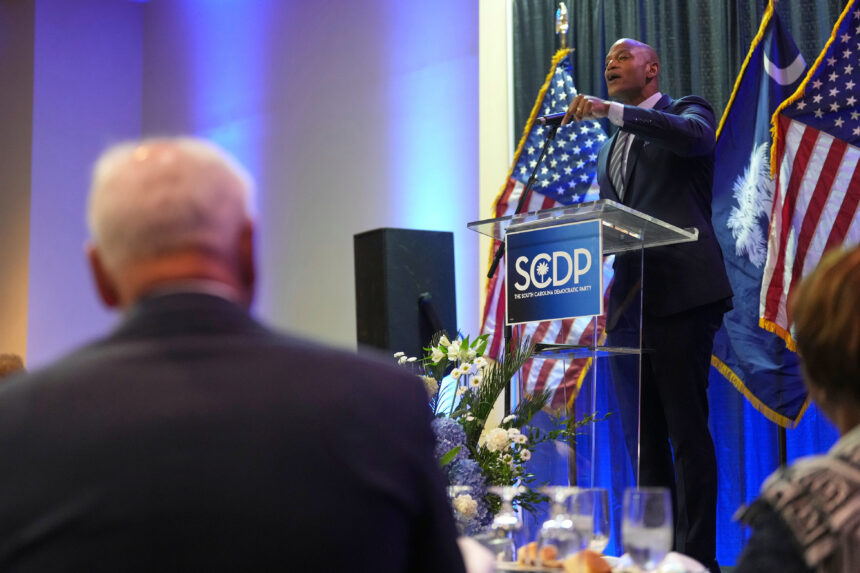The future of South Carolina as an early primary state for Democrats is uncertain as party insiders and activists grapple with the legacy of President Joe Biden. Five years ago, South Carolina played a crucial role in reviving Biden’s presidential campaign, ultimately leading to his nomination and subsequent presidency. However, with Biden’s reputation tarnished by negative coverage of his deteriorating condition and controversial decisions during his second term, some Democrats are questioning the state’s continued importance in the primary process.
There are growing calls from within the party to reconsider South Carolina’s position as the first primary state, with suggestions that states like New Hampshire, Nevada, Georgia, or North Carolina could take its place. Progressive voices are advocating for a shift away from traditional early primary states to reflect a more diverse and inclusive Democratic Party.
At the recent state party convention, National Committeewoman Bre Booker-Maxwell expressed frustration with Democrats who view South Carolina’s leading role as a negative aspect of Biden’s legacy. She emphasized the state’s long-standing commitment to the Democratic Party and its diverse electorate, urging critics to move past their issues with Biden and focus on the future.
In an effort to move beyond Biden’s shadow, South Carolina Democrats welcomed out-of-state governors Wes Moore of Maryland and Tim Walz of Minnesota to the annual World Famous Fish Fry hosted by Rep. Jim Clyburn. Both governors delivered speeches highlighting the need for Democrats to expand their reach and engage with voters in all states, not just traditional swing states.
Despite the challenges facing the party, South Carolina Democrats remain steadfast in their support for the state’s role in the primary process. They point to the state’s diverse electorate, its history of selecting successful presidential candidates, and its cost-effective campaign opportunities as reasons to maintain its position as an early primary state.
However, there is growing pressure from outside the state to reevaluate South Carolina’s place in the primary calendar. Some Democratic National Committee members have suggested that the state’s status as the first primary could be up for debate in the coming months, as the party seeks to adapt to changing political landscapes and address concerns about representation and inclusivity.
As the Democratic Party looks towards the future, the fate of South Carolina as an early primary state hangs in the balance. While the state has played a crucial role in past elections, the party faces tough decisions about how to best position itself for success in the years to come. Only time will tell if South Carolina will continue to lead the way in shaping the Democratic presidential nomination process. South Carolina’s standing in the primary calendar may be in jeopardy following Joe Biden’s decision to run for reelection, sparking outrage and disappointment among state Democrats. Many feel betrayed by Biden, who they believed would usher in a new era for the party.
Sam Skardon, chair of the Charleston County Democrats, expressed frustration over Biden’s decision, stating that it prevented the state from putting its best foot forward in the primary. The special connection that South Carolina Democrats felt with Biden has now been tainted by a sense of anger and betrayal.
Antjuan Seawright, a Democratic strategist, voiced concerns that Biden’s backpedaling on giving Black voters more of a say in the nomination process could erode trust within the party. He emphasized the importance of rebuilding trust and connection with voters in order to avoid further losses in future elections.
At the Palmetto Dinner, Jaime Harrison, chair emeritus of the DNC, tried to rally the party by highlighting their increased organization and energy since Biden’s departure from the stage. He praised the state party chair, Christale Spain, and predicted a “reckoning” for the South Carolina Republican Party in the upcoming election cycle.
Amanda Loveday, a Democratic strategist, acknowledged the setbacks that South Carolina Democrats faced in the last election cycle, including losses of key lawmakers and seats in the state legislature. She expressed concern about the party’s future prospects in the state and the need for a renewed focus on building support and winning back lost ground.
With neighboring states like North Carolina and Georgia making significant strides in recent elections, there is speculation that they may have stronger arguments for being prioritized in the primary calendar over South Carolina. The state’s Democrats are now faced with the challenge of regaining trust, rebuilding momentum, and positioning themselves for success in future elections.








